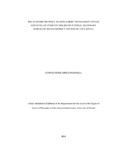| dc.description.abstract | The purpose of the study was to investigate the relationship between headteachers’ management styles and the level of students’ discipline. The key objectives were to establish the relationship between authoritarian management style, laissez faire management style, transactional management style, contingency management style, democratic management style and level of students discipline. It was hypothesized that participatory management styles was more likely to increase teachers‟ and parental input on students’ discipline management. This may in turn raise the level of students’ discipline. The study adopted a descriptive survey design. Data were collected using a self-administered questionnaire and interview schedules for headteachers and teachers-counsellors. Stratified random sampling was used to draw a sample of 59 headteachers, 59 Parents Teachers Association Chairpersons, 59 teachercounsellors and 400 students. A pilot study was conducted in six schools randomly selected from the boys schools, girls schools and mixed schools from Rongo District and Kisumu City. The reliability of the instruments was 0.95 for headteachers’ questionnaires, 0.94, 0.93 and 0.92 for the Parent Teachers Association Chairpersons, teacher-counsellors and students respectively. Data were analyzed using frequency counts, the mean, and standard deviation and hypotheses tested using chi-square, t-test and one-way ANOVA at 0.05 level of significance. The main findings revealed that there was a negative relationship between authoritarian and laissez faire management styles on students’ discipline. The study also revealed that there was a positive relationship between transactional, contingency and democratic management styles and level of students disicpline. The highly qualified headteachers applied participatory discipline management styles compared with their less qualified counterparts. Headteachers heading mixed schools applied participatory discipline management styles compared to headteachers’ heading single sex-schools. There was a negative correlation between type of school and teachers’ and parental input. Headteachers heading rural public secondary schools in Rongo District applied participatory management styles compared to headteachers heading urban public secondary schools. Moreover, teachers’ and parental input was higher in urban public secondary schools compared to rural public secondary schools. The relationship between discipline management styles and the level of students‟ discipline was positive. It was recommended that there be induction training in management and leadership for headteachers by the Kenya Educational Management Institute. Headteachers with lower professional qualifications, headteachers in boys’ schools and those in charge of rural public secondary schools tended to apply non-participatory discipline management styles. In this regard, these categories of headteachers should be given more attention by Kenya Education Management Institute when organizing school management workshops. Further research be carried out on discipline management styles and the level of students’ discipline in private secondary schools to determine whether ownership of the school has any significant relationship between discipline management styles and the level of students’ discipline in private secondary schools.
. | en_US |

